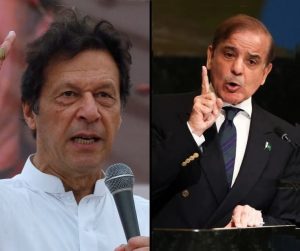Intense election campaigning: High-stakes gamble continues
Parties primarily worry about stopping and pushing elections amid political and economic unrest.

ISLAMABAD: The bigger problem for the parties is how to force elections and how to avoid them, despite the fact that the parliament is dysfunctional, the assemblies are on the point of being dissolved, the economy is in ruins, terrorism is reviving, and political unrest is growing by the day.
The PTI is threatening to dissolve the Punjab and Khyber-Pakhtunkhwa assemblies and is preparing to appear before National Assembly Speaker Raja Pervaiz Ashraf for the verification of more than 100 of its lawmakers’ resignations that have been pending since April. The ruling PML-N led alliance at the Centre is pledging to obstruct all such measures and is adamant that elections would only be held once the constitutional period had passed.
The PTI stepped up its efforts to dissolve the legislatures only to reconvene after winning the general elections, so the ruling coalition is working to thwart those efforts by presenting a no-confidence motion against Chaudhry Pervaiz Elahi, the chief minister of Punjab, as well as the speaker and deputy speaker of the provincial assembly, and threatening to impose governor’s rule if necessary so that elections take place after August 2023.
Even though the PML-N has repeatedly said that it will not call for early elections, even if the Punjab and K-P assemblies are disbanded, it has come to the realisation that, should the PTI MNAs’ resignations be accepted, it will be difficult to avoid elections. The plan is to drag out the process until elections are held on the seats that will become vacant after next August.
The assembly secretariat has announced that resignations will not be accepted collectively and that each MNA will need to personally appear before the NA speaker to have their resignations verified. On the one hand, the PTI has planned for its MNAs to visit the NA next Wednesday for the acceptance of their resignations.
To force general elections, the PTI had resigned in large numbers back in April. However, the government has so far successfully rejected all of the PTI’s proposals, with or without court rulings at the Centre and in Punjab. Initially, the Supreme Court’s ruling had preserved NA, and more recently, the Lahore High Court’s ruling had preserved the Punjab Assembly, if only for a short while with the potential to last longer.
The PTI believes that now is the ideal moment to hold elections, particularly given its recent success in by-elections. Even though it organised protracted marches, held rallies, and threatened to march on the capital, nothing has changed.
The PML-N, on the other hand, thinks elections should be conducted as soon as possible since it needs time to sway public opinion back in its direction after making some “difficult decisions” to put things right.
The PTI blames the past administrations and charges them with corruption and poor leadership, while the current administration criticises the PTI for its “poor performance” and “incompetence”.
The goal of the conflict is to portray the opposing party in the worst possible light and seize power, regardless of what happens to the nation in the interim.
Although the attempts to compel elections have not been successful, they nonetheless go on. Every countermove is made with the sole intention of delaying elections till the terms of the assemblies are up.
Politics is at its highest point, and the people are at its lowest point, or rather, they are the victims of the actions of previous rulers that have failed to bring assistance to the people when they most needed it. If both sides don’t get together and work out a solution, the economy will continue to deteriorate, terrorist attacks will increase, and the nation’s citizens will continue to suffer as a result of the ongoing political squabbling.
Instead of continuing the argumentative discourse, it is time to sit across the table and find solutions.










































